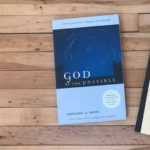We run our website the way we wished the whole internet worked: we provide high quality original content with no ads. We are funded solely by your direct support. Please consider supporting this project.
What is the significance of 1 Chronicles 21:7–13?
The Lord gives David three options of how Israel may be judged. “Three things I offer you; choose one of them, and I will do it to you.”
Paralleling 2 Samuel 24:12–16, this passage reveals that the Lord gives people genuine alternatives and then responds to their choices. If the future is unalterably settled in God’s mind, however, these alternatives are merely charades. God could just as well have unilaterally declared the curse he knew David would choose.
Category: Q&A
Tags: Open Theism, Q&A
Topics: Open Theism
Verse: Chronicles 21
Related Reading

Why do you argue that discipleship and politics are rooted in opposite attitudes?
Question. At a recent conference I heard you argue against the idea that there could ever be a distinctly “Christian” political position by contending that political disputes are premised on a claim to superiority while discipleship is fundamentally rooted in humility. I don’t think I get what you mean. Can you explain this? Answer: In…

Podcast: Where Does Omniscience Fit In Within Open Theism?
Greg pontificates on what God knows. http://traffic.libsyn.com/askgregboyd/Episode_0280.mp3

Does God Exist Outside of Time?
Our friend Jeremy Jernigan wrote something recently that we wanted to share with you today. Jeremy is the author of Redeeming Pleasure and Teaching Pastor at Central Christian Church in Arizona. He blogs regularly at TomorrowsReflection.com. He’s the husband to Michelle and dad to five amazing little kids. You can connect with him on Twitter,…

How do you respond to Matthew 20:17–19?
“The Son of Man will be handed over to the chief priests and scribes, and they will condemn him to death; then they will hand him over to the Gentiles to be mocked and flogged and crucified, and on the third day he will be raised.” God knew perfectly the hearts of all the Jewish…

Podcast: The Making of God of the Possible
Greg talks about making his book “God of the Possible,” then offers his initial thoughts on Thomas Oord’s book “God Can’t.” http://traffic.libsyn.com/askgregboyd/Episode_0468.mp3

How do you respond to 2 Samuel 17:14–15?
“Absalom and all the men of Israel said, ‘The counsel of Hushai the Archite is better than the counsel of Ahithophel.’ For the Lord had ordained to defeat the good counsel of Ahithophel, so that the Lord might bring ruin on Absalom.” This passage is sometimes cited to support the view that God ordains all…
